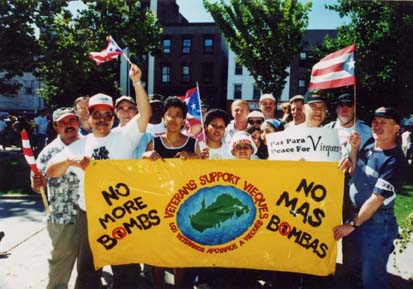 |
Not One More BombBy Dave ClinePuerto Rico's recent elections outcome has set a new stage in the struggle to end the US Navy's continued bombing of the small island municipality of Vieques. Unlike the American presidential election, the vote there was an important victory for the people. A popular movement to get the Navy out began in April 1999 after the death of a civilian guard by two errant 500-pound bombs during a training exercise. Local residents, fed up with years of the naval bombardment that threatens their health, land and livelihood, occupied the target ranges in protest. They set up a dozen camps that physically stopped the bombing and shelling for over a year. Support quickly became organized throughout Puerto Rico with all sectors of society mobilizing in defense of Isla Nena (the "little girl island"). Initially, Puerto Rico's governor voiced support and demanded an immediate end to the bombing. Then last January he changed course, agreeing to an executive order from President Clinton that allowed the Navy to continue bombing until 2003 and called for a referendum to determine whether the Navy would leave after that. This agreement was broadly viewed as a betrayal, and three weeks later 150,000 people flooded San Juan to demand Not One More Bomb - Peace For Vieques in the largest demonstration ever held in Puerto Rico's history. Last May, federal marshals launched predawn raids, destroying the resistance camps and arresting several hundred occupants. Since then, the Navy has resumed maneuvers, recently bombing the area two days before Christmas and on the day after New Year's. Every naval operation has been met with non-violent civil disobedience and hundreds more people have been arrested. In November, elections were held throughout Puerto Rico, and an important advance was made with the selection of Sila Calderon as governor and Damaso Serrano as mayor of Vieques. Both ran as candidates of the Popular Democratic (commonwealth) Party which now controls the majority in the legislature as well. Sila Calderon is the first woman to be elected governor. She ran on a platform of greater autonomy for the island and peace for Vieques. Her election is a popular rejection of the previous governor's efforts to make Puerto Rico the 51st state, and she has repeatedly said that ending the Navy's bombing is an election mandate. At her inauguration, she declared, "The people of Puerto Rico want an immediate halt to the naval exercises. Sixty years of menace to the health and security of our countrymen is unacceptable for any civilized and peaceful society." She has pledged that during her first ninety days in office, she will remove the Fueza de Choque, an elite police unit assigned to guard the gates of Camp Garcia, the base on Vieques, and will take legal action against the Navy for violations of the Environmental Protection Act. In the Vieques race for mayor, Damaso Serrano won 63.8% of the vote: an almost 2-to-1 defeat of the pro-Navy candidate. As he put it, "My campaign focused on achieving the immediate cease and desist of all military activities in Vieques, which is the primary goal and demand of our people." He is a respected community activist and was one of the people arrested when the protest camps were raided by federal agents. Many say that his election was the real referendum on whether the Navy should leave. His administration is expected to advance grassroots organization throughout the barrios of Vieques. These elections have set a new stage in the struggle. A broad political consensus has been reestablished to deal with Washington, but with the pro-Pentagon Bush gang occupying the White House, it will not be an easy victory. Navy spokesmen have begun demanding that Sila honor the discredited settlement, even though congressional changes last fall provoked Clinton to state, in a November 7, 2000 interview with Amy Goodman on Pacifica Radio, "The Republicans in Congress broke the agreement, and instead of giving the western part of the island to Puerto Rico, gave it to the Interior Department to manage. If I can't find a way to give that island, the western part of the island back to the people of Puerto Rico, and to honor the agreement that the government of Puerto Rico itself made with the support of the local leaders, including the mayor of Vieques, then the people of Puerto Rico I think have a right to say the federal government broke its word, and the training has to stop right now." The Navy brass are still hoping to stay on Vieques despite the expressed will of the Puerto Rican people. To them, Vieques is the crown jewel of their training program. Although they claim to be defending freedom and democracy, the Navy's actions make a mockery of their words. It would be more accurate to say that their actions are rooted in colonial control and imperial arrogance. The people of Vieques should be supported by all who want justice and peace.
|


